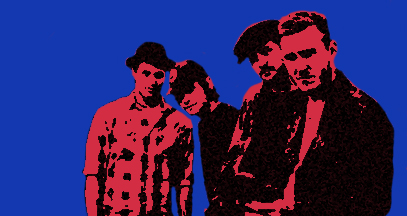The Art of Gaslight Anthem's Songs

It’s been a bit of a strange year for me. Over the past ten or twelve months, I feel as if some certainties in my life that I took for granted – professionally and personally – became less certain, and the disquieting noise of doubt has grown louder and louder in my skull. It’s not unusual for me to greet what’s to come in my future with a healthy dose of unease, and I’ve always been a wee bit of a worrier. But I find myself less confident about a lot of aspects of my life or, at the very least, more confused as to how it’s all supposed to fit together. It feels as if I’ve lost the plot a bit.
Given this, I doubt it’s a coincidence that I’ve probably listened to the Gaslight Anthem this year more than any other artist.
The Gaslight Anthem are like a one-trick stallion. Though their entire gimmick comes down to a single stunt – “What if the Replacements wrote Bruce Springsteen songs?” –that stunt is flat-out awesome. Over fuzzed-up guitars, frontman Brian Fallon sings of late nights running away from the boredom of nothingness; of the noble pursuit of broken hearts; of lonely dance floors and crowded backseats. It’s brash, anthemic, and powerful, track after track. Who cares that the band’s breakthrough record – last year’s The ’59 Sound – really isn’t all that different from their 2007 debut, or that that the band probably lacks the range to really do much more than keep repeating themselves in the future? They don’t do much, but they do incredible, almost magical things with it.
True, perhaps I’m kind of predisposed to being a fan given the ‘heart-on-sleeve’ Springsteen influence – the band references Boss lyrics with abandon – but there’s more to the Gaslight Anthem’s appeal than just echoes of my record collection. There’s something about Fallon’s storytelling style that’s particularly enticing, that makes it possible to revisit these songs time and time again without really diminishing the returns. But figuring out exactly what that ‘something’ is ain’t easy.
The irony is that to a 21st century 20-something, the particulars of a Gaslight Anthem song are almost wholly unrelatable and rather unrealistic. Whereas it’s conceivable that Bruce Springsteen could have lived some of the 1950s American Graffiti-esque scenescapes that he often painted in song, it’s highly doubtful that these modern Jersey boys spent their teenage or post-teenage years with old cars, fast women, worn-out diners and all the other archetypal motifs they play with. They do their damnedest make you believe it, sure – unlike Springsteen, Fallon never distances the listener by inferring the existence of characters – but there’s always this hint of self-awareness lurking in the corner of your brain as you listen, a piece of you that knows that this entire plot is manufactured from another generation’s playbook.
But the emotions that Fallon sings of – loss, loneliness, romance, dance-floor politics – are timeless, universal. It’s essentially teenageism, re-examined a few years down the road with an healthy dose of self-awareness and a dash of nostalgia to taste. So given this, why the wholehearted embrace of another generation’s mythology to try and communicate these sensations? And why am I, child of the modern world, completely head-over-heels infatuated with it all?
Here’s the thing – great rock music is less about the explanation of plot and more about the inference of plot. When writers use the word “storytelling” to talk about a pop or rock lyric, they’re rarely describing the song’s narrative; in fact, straight-ahead narrative is actually a bit rare. Instead, the best songs often give us little more than a single moment: a fleeting minute, a pivotal scene, the emotional climax of a larger tale. And it’s the lyricist’s responsibility to give us just enough details to allow us to fill in the rest with our own imagination. Great songwriters don’t write plots on their own; they make the listener an active participant in the writing process.
On The ’59 Sound, the Gaslight Anthem enlist us as equal partners in manufacturing their landscapes of imagined nostaligia. They give us all the touchpoints we need – in “Great Expectations,” for example, we get a burned-out diner, oldies radio, drunk tanks and boy-stealing vixens from days of yore – and we join in and connect the dots, making the entire scene our own. I’m usually the first to challenge any sign of “baby boom supremacy”: the imposition of my parents’ culture as superior to mine just by virtue of their generation’s size and societal domination. But here, I’m on-board 100 per cent, singing along to the boisterous chorus in spite of the fact that I’ve never lived anything exactly like it.
Perhaps it’s because Fallon sounds like I feel these days: a little bit aimless, slightly lost and desperately seeking out narrative. Perhaps it’s because these strange scenarios feel certain in a way that my 21st century existential angst can never quite claim to be be. Perhaps it’s because we haven’t quite figured out how the modern world is supposed to work quite yet, so we find comfort in these pre-established storybook routines.
Whatever the case, I keep coming back to The ’59 Sound over and over again, a willing accomplice in its constructions. Though I’ll probably grow tired of it at some point, for now I welcome every opportunity to join the record for another nostalgic drive off into the night, seeking out sensation and pining for our lost plots.
(From McNutt Against the Music.)





